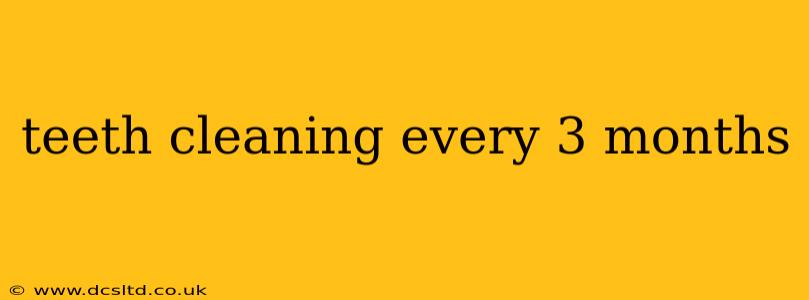Maintaining optimal oral health is crucial for overall well-being. While the recommended frequency of professional teeth cleanings is a common question, the answer isn't always straightforward. This comprehensive guide explores the necessity of professional teeth cleanings every three months, examining who might benefit and the potential drawbacks.
How Often Should You Get Your Teeth Cleaned?
The standard recommendation from dental professionals is to schedule professional teeth cleanings every six months. This guideline is based on extensive research and helps maintain good oral hygiene for most individuals. However, the frequency might need adjustment based on individual needs and risk factors.
What are the Benefits of More Frequent Cleanings (Every 3 Months)?
While six months is the general recommendation, some individuals might benefit from more frequent professional cleanings, such as every three months. These situations include:
-
Individuals with gum disease (gingivitis or periodontitis): More frequent cleanings can help control inflammation and prevent disease progression. Regular professional cleaning helps remove plaque and tartar buildup below the gum line, which are major contributors to gum disease.
-
Patients with a history of cavities: For those prone to cavities, more frequent cleanings can help detect and address early signs of decay, preventing larger, more invasive procedures later. Early detection is key to preserving tooth structure.
-
Smokers: Smoking significantly increases the risk of gum disease and other oral health issues. More frequent cleanings can help mitigate these risks. The staining from smoking also makes more frequent cleanings beneficial for aesthetics.
-
Patients with diabetes: Diabetes can increase susceptibility to gum disease. Closer monitoring through more frequent dental checkups is often advised.
What are the Potential Drawbacks of Cleaning Every 3 Months?
While more frequent cleanings offer benefits in certain circumstances, there are also potential downsides:
-
Cost: More frequent cleanings will obviously lead to higher dental expenses. This is a significant factor to consider, especially for those without comprehensive dental insurance.
-
Time commitment: Scheduling more frequent appointments requires a greater time commitment. This can be challenging for those with busy schedules.
Is it Harmful to Clean Your Teeth More Often Than Recommended?
No, getting your teeth professionally cleaned more often than recommended isn't inherently harmful. However, excessive cleaning can potentially damage the tooth enamel if done improperly. Trust your dentist's professional judgment to determine the appropriate frequency based on your specific oral health needs.
What Happens During a Professional Teeth Cleaning?
A professional teeth cleaning usually involves:
- Examination: A thorough examination of your teeth and gums.
- Removal of plaque and tartar: Using specialized tools to remove plaque and tartar that's built up on your teeth and below the gum line.
- Polishing: Polishing your teeth to remove surface stains.
- Fluoride treatment (optional): Applying fluoride to strengthen tooth enamel and protect against cavities.
Can I Replace Professional Cleanings with Better Home Care?
While excellent home oral hygiene is crucial, it cannot entirely replace professional cleanings. Professional cleaning removes plaque and tartar that's inaccessible with at-home tools.
How Can I Improve My Oral Hygiene at Home?
Maintaining excellent oral hygiene at home is vital, regardless of the frequency of professional cleanings. This includes:
- Brushing twice daily: Using fluoride toothpaste and a soft-bristled toothbrush.
- Flossing daily: Removing plaque and food particles between your teeth.
- Using mouthwash (optional): Helping to reduce bacteria and freshen breath.
Conclusion: Tailoring Cleanings to Individual Needs
The decision of how often to get your teeth professionally cleaned is a personalized one. While the standard recommendation is every six months, factors like gum disease, cavity history, smoking, and diabetes can justify more frequent cleanings. Always consult your dentist to determine the best cleaning schedule for your individual oral health needs. Open communication with your dentist is essential to maintain healthy teeth and gums for a lifetime.
